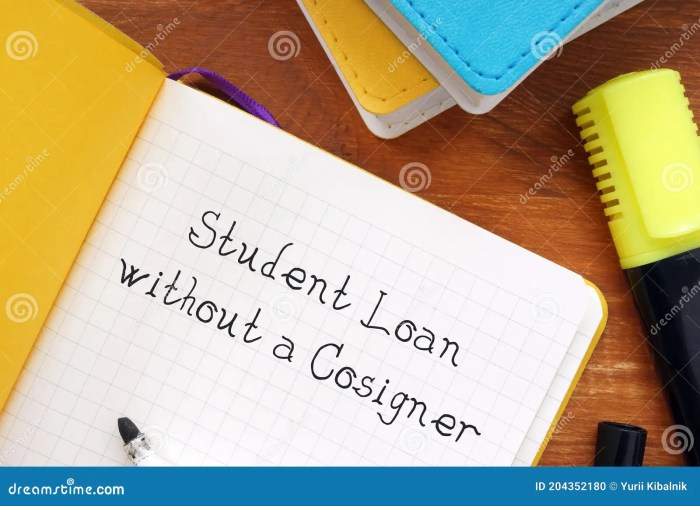
Securing a private student loan without a cosigner can seem daunting, but it’s achievable with careful planning and a strong financial foundation. This guide explores the eligibility requirements, strategies for improving your chances, and the various loan options available to those who can navigate this path independently. We’ll demystify the process, providing insights into building credit, demonstrating financial stability, and understanding the responsibilities involved.
This comprehensive resource equips you with the knowledge to confidently approach lenders and secure the funding you need for your education. We’ll cover crucial aspects like credit scores, income verification, and alternative documentation, ensuring you’re well-prepared for every step of the application process. Ultimately, understanding your financial standing and exploring available options empowers you to make informed decisions about your educational financing.
Eligibility Requirements for Private Student Loans Without a Cosigner
Securing a private student loan without a cosigner requires demonstrating a strong financial profile to the lender. This typically involves meeting specific credit score, income, and other eligibility criteria. Lenders assess your risk as a borrower, and a higher level of financial responsibility is expected when you’re applying solo.
Credit Score Requirements
Lenders generally require a higher credit score for applicants without cosigners. A good credit score demonstrates a history of responsible financial management. While the exact minimum credit score varies among lenders, it’s often significantly higher than the minimum required for loans with a cosigner, typically ranging from 660 to 700 or even higher. A score below this range might make it difficult, if not impossible, to qualify for a private student loan without a cosigner. Applicants with excellent credit scores (750 and above) are generally in a much stronger position to secure favorable loan terms.
Income Verification Processes
Income verification is crucial for demonstrating your ability to repay the loan. Lenders utilize various methods to verify income, including requesting tax returns (W-2s and 1099s), pay stubs, bank statements, and employment verification letters. The extent of documentation required will depend on the lender and the applicant’s overall financial profile. Consistent and substantial income is a key factor in approval. For self-employed individuals, providing detailed financial statements and tax returns is especially important.
Alternative Documentation
While a cosigner significantly strengthens an application, some lenders may consider alternative documentation to mitigate the risk associated with a lack of cosigner. This might include providing proof of significant assets, such as savings accounts, investment accounts, or valuable property. Strong financial history demonstrated through consistent on-time payments on credit cards and other loans can also be beneficial. Demonstrating a strong history of responsible financial management, even without a lengthy credit history, can be persuasive. For example, consistently saving a substantial portion of income over several years could be considered.
Comparison of Eligibility Criteria Across Lenders
Eligibility criteria for private student loans without cosigners vary significantly among lenders. Some lenders may be more lenient than others, while some may focus on specific aspects of your financial profile. It is crucial to compare offers from multiple lenders to find the best terms and conditions.
| Loan Provider | Minimum Credit Score | Income Requirements | Other Eligibility Factors |
|---|---|---|---|
| Lender A | 700 | Documented income sufficient to cover loan repayment | Strong credit history, demonstrable assets |
| Lender B | 680 | Consistent income for at least two years | Low debt-to-income ratio, positive credit history |
| Lender C | 720 | Proof of income via tax returns and pay stubs | Strong savings history, minimal late payments |
| Lender D | 660 (with strong compensating factors) | Stable employment history, sufficient income | High savings, strong asset base |
Exploring Different Loan Products and Features

Securing a private student loan without a cosigner often requires a strong credit history and financial profile. However, several loan products cater to this specific need, each with its own set of features, benefits, and associated costs. Understanding these differences is crucial for making an informed borrowing decision. This section will explore various loan types, highlighting key aspects to consider.
Private student loans without cosigners typically fall into a few categories, primarily differentiated by their interest rates, repayment terms, and eligibility criteria. While specific offerings vary by lender, understanding these general categories will help you navigate the application process.
Types of Private Student Loans Without Cosigners
Several lenders offer private student loans designed for borrowers who can qualify without a cosigner. These loans often require a demonstrably strong credit history and stable income. They are typically unsecured, meaning they are not backed by collateral. The specific terms and conditions will vary based on the lender and the individual borrower’s creditworthiness.
Key Features and Benefits of Different Loan Programs
A key feature to consider is the interest rate. Lower interest rates translate to lower overall borrowing costs. Some lenders may offer variable interest rates, which fluctuate with market conditions, while others may offer fixed rates, providing predictability in monthly payments. Additionally, some programs might include benefits like grace periods (a period after graduation before repayment begins) or options for deferment or forbearance (temporary suspension of payments under certain circumstances). Borrowers should carefully review the loan terms and conditions to fully understand these benefits.
Interest Rates and Repayment Terms
Interest rates for private student loans without cosigners are highly variable, influenced by factors such as the borrower’s credit score, credit history, income, and the loan amount. Generally, borrowers with excellent credit scores and a proven history of responsible financial management will qualify for the most favorable interest rates. Repayment terms typically range from 5 to 15 years, though some lenders may offer longer repayment periods. Shorter repayment terms result in higher monthly payments but lower overall interest paid, while longer terms lead to lower monthly payments but higher total interest paid over the life of the loan.
Examples of Loan Providers
Several reputable financial institutions offer private student loans without cosigners. These include, but are not limited to, Sallie Mae, Discover Student Loans, and Citizens Bank. It’s important to note that the specific terms and conditions offered by each lender will vary, and it’s advisable to compare offers from multiple lenders before making a decision. It is crucial to carefully review the terms and conditions of any loan offer before accepting it.
Comparison Table of Loan Features
| Loan Provider (Example) | Interest Rate (Example) | Repayment Options (Example) | Fees (Example) |
|---|---|---|---|
| Sallie Mae | Variable, starting at 6.5% | Standard, graduated, extended | Origination fee, late payment fee |
| Discover Student Loans | Fixed, starting at 7.0% | Standard, income-driven | Origination fee |
| Citizens Bank | Variable, starting at 6.8% | Standard, accelerated | Origination fee, late payment fee |
Disclaimer: The interest rates, repayment options, and fees provided in this table are examples only and may not reflect current offerings. Actual rates and terms will vary based on individual borrower circumstances and lender policies. Always refer to the lender’s website for the most up-to-date information.
Understanding the Risks and Responsibilities

Securing a private student loan without a cosigner offers freedom but comes with heightened financial responsibility. The absence of a cosigner means you are solely liable for the entire loan amount, regardless of unforeseen circumstances. Careful consideration of the potential risks and a comprehensive understanding of your responsibilities are crucial before proceeding.
Potential Risks of Private Student Loans Without a Cosigner
Borrowing significant sums without a cosigner exposes you to substantial financial risk. Defaulting on the loan can severely damage your credit score, making it difficult to obtain credit for future purchases like a car or a house. Furthermore, lenders may pursue aggressive collection methods, including wage garnishment or legal action, to recover the debt. The interest rates on private student loans are typically higher than federal loans, leading to a larger overall repayment burden. This increased cost can significantly impact your long-term financial well-being. For example, a $50,000 loan with a 7% interest rate will accrue significantly more interest over time compared to a similar loan with a 4% rate. This difference can translate into thousands of extra dollars in repayment.
Responsibilities of Private Student Loan Borrowers
Borrowers are fully responsible for timely loan repayments according to the terms Artikeld in the loan agreement. This includes understanding the repayment schedule, interest rates, and any associated fees. Failing to make payments on time can result in late fees, increased interest charges, and potential damage to your credit score. It is crucial to maintain open communication with your lender and address any potential payment difficulties promptly. Proactive engagement with the lender is key to avoiding more serious consequences. This might involve exploring options like deferment or forbearance if facing temporary financial hardship.
Scenarios Leading to Repayment Difficulties
Several scenarios can make loan repayment challenging. Unexpected job loss, a significant medical emergency, or a decrease in income can create financial strain, making it difficult to meet loan obligations. Similarly, unforeseen expenses like car repairs or home maintenance can disrupt carefully planned budgets. For example, an individual who secured a private student loan to fund their education and subsequently experiences unexpected unemployment might find it extremely difficult to manage monthly payments, especially if they lack savings or emergency funds. This could lead to default and negatively impact their credit history.
Budgeting and Financial Planning for Loan Repayment
Effective budgeting and financial planning are essential for successful loan repayment. Creating a realistic budget that accounts for all expenses, including loan payments, is crucial. Tracking income and expenses allows for identification of areas where savings can be maximized. Prioritizing loan payments and exploring debt management strategies, such as the debt snowball or debt avalanche methods, can facilitate repayment. Consider building an emergency fund to handle unexpected expenses and prevent default. For instance, allocating a portion of each paycheck to both loan repayment and an emergency fund will help manage unexpected events and maintain consistent payments.
Checklist Before Accepting a Private Student Loan
Before accepting a private student loan, carefully consider the following:
- Compare interest rates and loan terms from multiple lenders.
- Assess your ability to repay the loan based on your expected income.
- Understand the repayment schedule and total cost of the loan.
- Evaluate the potential impact on your credit score if you default.
- Explore all available federal loan options before considering a private loan.
- Develop a comprehensive budget that includes loan repayment.
- Consider the potential risks and consequences of borrowing without a cosigner.
Seeking Financial Guidance and Support

Navigating the complex world of private student loans, especially without a cosigner, requires careful planning and a thorough understanding of your financial situation. Seeking professional financial advice is crucial to making informed decisions that align with your long-term financial goals and avoid potential pitfalls. A well-informed approach can significantly reduce the risk of overwhelming debt and ensure you choose the loan option best suited to your needs.
Before committing to a private student loan, it’s essential to understand the various loan products, interest rates, repayment terms, and potential consequences of default. This is where professional financial guidance becomes invaluable. Financial counselors and advisors can provide unbiased advice, helping you compare different loan offers, understand the implications of your choices, and create a realistic repayment plan. They can also help you explore alternative funding options and strategies for managing your debt effectively.
The Role of Financial Counselors in Loan Selection
Financial counselors play a vital role in assisting students in navigating the complexities of student loan options. They provide personalized guidance based on individual financial circumstances, helping students understand their repayment capabilities and the long-term implications of their borrowing decisions. They can help students compare interest rates, fees, and repayment terms across different lenders, identify potential hidden costs, and develop strategies for minimizing debt accumulation. Furthermore, they can offer budgeting advice and explore options for debt consolidation or refinancing, should the need arise. For example, a counselor might help a student compare a loan with a fixed interest rate versus a variable rate, explaining the advantages and disadvantages of each in relation to the student’s financial projections and risk tolerance.
Resources for Students Needing Financial Assistance
Numerous resources are available to students seeking financial assistance and guidance on managing student loan debt. Many universities and colleges offer free or low-cost financial aid counseling services to their students. These services often include one-on-one consultations with financial aid advisors, workshops on financial literacy, and access to online resources and tools. Additionally, numerous non-profit organizations and government agencies provide similar services to students nationwide. These organizations frequently offer workshops, webinars, and online resources that cover topics such as budgeting, debt management, and financial planning. For instance, the National Foundation for Credit Counseling (NFCC) offers free financial counseling services to consumers facing various financial challenges, including student loan debt.
Finding and Evaluating Reputable Financial Advisors
Finding a trustworthy financial advisor is crucial. Start by checking their credentials and certifications. Look for advisors with designations such as Certified Financial Planner (CFP®) or Chartered Financial Consultant (ChFC®), which indicate a commitment to professional standards and ethical practices. Verify their experience in working with students and managing student loan debt. Check online reviews and testimonials from previous clients to gauge their reputation and effectiveness. Be wary of advisors who promise unrealistic returns or guarantee specific outcomes, as these are often red flags. A good advisor will provide objective, data-driven advice tailored to your specific financial circumstances. Finally, ensure the advisor operates within a transparent and ethical framework, disclosing all fees and potential conflicts of interest.
Organizations and Websites Offering Financial Guidance
Finding reliable and trustworthy sources of financial guidance is paramount when making crucial decisions about student loans. Several organizations and websites offer free or low-cost financial guidance services to help students navigate the complexities of student loan debt. It’s important to research and choose organizations with a proven track record of providing accurate and unbiased information.
- National Foundation for Credit Counseling (NFCC): Offers free and low-cost credit counseling and debt management services.
- Financial Aid Offices at Colleges and Universities: Most institutions provide free financial aid counseling to their students.
- Federal Student Aid (FSA): A U.S. government website offering comprehensive information about federal student aid programs and loan repayment options.
- Consumer Financial Protection Bureau (CFPB): Provides resources and tools to help consumers understand their financial rights and avoid predatory lending practices.
- MyFICO: Offers free resources and educational materials about credit scores and financial management.
Final Summary
Successfully obtaining a private student loan without a cosigner requires proactive preparation and a clear understanding of your financial profile. By diligently building credit, demonstrating financial responsibility, and carefully comparing loan options, you can significantly improve your chances of approval. Remember, securing a loan is a significant financial commitment; responsible borrowing and diligent repayment planning are essential for long-term financial well-being.
Common Queries
What is a good credit score for a private student loan without a cosigner?
Lenders generally prefer applicants with credit scores above 670, but requirements vary. A higher score increases your chances of approval and may lead to better interest rates.
Can I get a private student loan without a cosigner if I have limited credit history?
While challenging, it’s possible. Demonstrating a stable income, strong employment history, and alternative documentation (like savings accounts) can help compensate for limited credit history.
What happens if I default on a private student loan?
Defaulting can severely damage your credit score, impacting future borrowing opportunities. It may also lead to wage garnishment or legal action by the lender.
Are there any government programs that can help me get a student loan without a cosigner?
Federal student loans are generally more accessible than private loans and don’t usually require a cosigner. Explore options like Direct Subsidized and Unsubsidized Loans through the government.
